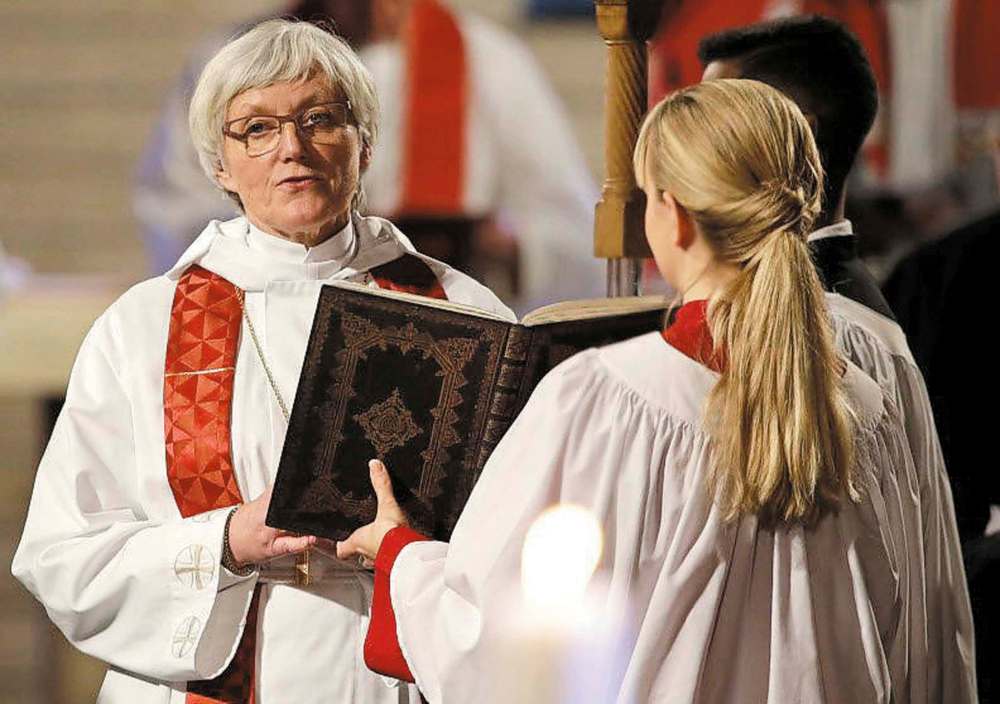More words for God
Making language of liturgy more inclusive a debate worth having
Advertisement
Read this article for free:
or
Already have an account? Log in here »
To continue reading, please subscribe:
Monthly Digital Subscription
$0 for the first 4 weeks*
- Enjoy unlimited reading on winnipegfreepress.com
- Read the E-Edition, our digital replica newspaper
- Access News Break, our award-winning app
- Play interactive puzzles
*No charge for 4 weeks then price increases to the regular rate of $19.00 plus GST every four weeks. Offer available to new and qualified returning subscribers only. Cancel any time.
Monthly Digital Subscription
$4.75/week*
- Enjoy unlimited reading on winnipegfreepress.com
- Read the E-Edition, our digital replica newspaper
- Access News Break, our award-winning app
- Play interactive puzzles
*Billed as $19 plus GST every four weeks. Cancel any time.
To continue reading, please subscribe:
Add Free Press access to your Brandon Sun subscription for only an additional
$1 for the first 4 weeks*
*Your next subscription payment will increase by $1.00 and you will be charged $16.99 plus GST for four weeks. After four weeks, your payment will increase to $23.99 plus GST every four weeks.
Read unlimited articles for free today:
or
Already have an account? Log in here »
Hey there, time traveller!
This article was published 24/02/2018 (2835 days ago), so information in it may no longer be current.
A recent uproar around theological language in the Christian church demonstrates that how people speak about God can be extremely personal and deeply entrenched, a Winnipeg-based Lutheran bishop says.
“It’s hard to change the language in those things that are internalized and part of the rhythm of their faith,” says National Bishop Susan Johnson of the Evangelical Lutheran Church in Canada.
“It’s like changes to O Canada.”

Unlike the recent modifications to the Canadian anthem, revisions to make the Church of Sweden’s liturgy more inclusive led to international headlines and cries of fake news by church officials.
News agencies reported that the Church of Sweden, which has about six million baptized members, was banning male pronouns for God, removing the name “Lord” in reference to the deity, and insisting on gender-neutral terms.
Not true, says the head of the church’s service of worship committee, which is working on a new liturgical handbook to be released in May.
Instead, the updates will use more inclusive language and options for various ways to speak about the deity, says Sofija Pedersen Videke in a statement released late last year.
“The old handbook is from 1986 and the new edition is much more in line with the Swedish Bible translation made in 2000,” Pedersen Videke told Swedish news agency the Local.
“God is beyond ‘she’ and ‘he’; God is so much more.”
She says what the new liturgy will do is provide more options referring to the deity, including using the words “in the name of the triune God” as an alternative to “Father, Son and Holy Spirit.”
That’s an option already available to Canadian Lutherans, Johnson says, adding her denomination is reviewing its inclusive-language guidelines.
“Language is living and as we have new ideas, we need to be more precise,” she says about the updates expected next month.
Johnson says Archbishop Antje Jackelén of Sweden recently sent a message to other Lutheran groups playing down the changes and explaining the misrepresentation in the media.
“I think the Church of Sweden is under more scrutiny because of their actions around human sexuality and they were misunderstood” about the liturgy changes, Johnson says.
The Swedish Lutheran church marries and ordains people from the LGBTTQ* community, which Johnson says resulted in criticism from more conservative groups within the wider Lutheran church.
Whatever the context, varying references to God can create deeper and broader understanding of the deity, Johnson says.
“When we use different language for God and for people, we think about our prayers and singing in a different way,” Johnson says in a telephone interview from her Winnipeg office.
“We think about what messages we are trying to communicate and what we are trying to understand. It refreshes and renews the relationship.”
And people relate differently to images, says a local United Church of Canada minister, underlining the importance of using a variety of names and metaphors for the deity.
“Our multiple images of God try to house all the ways of seeing God,” says Rev. Loraine MacKenzie Shepherd of Westworth United Church, referring to biblical terms for God such as father, mother, light, rock and bread.
She says the United Church has an inclusive-language policy, but individual congregations decide how to implement it.
MacKenzie Shepherd believes that the discussion around theological language needs to move beyond God and gender to include all types of diversity.
“If we’re all created in God’s image, that suggests God would encompass all of our diversity,” she says.
“God is so much bigger than we can even dream or imagine.”
brenda@suderman.com
The Free Press is committed to covering faith in Manitoba. If you appreciate that coverage, help us do more! Your contribution of $10, $25 or more will allow us to deepen our reporting about faith in the province. Thanks! BECOME A FAITH JOURNALISM SUPPORTER

Brenda Suderman has been a columnist in the Saturday paper since 2000, first writing about family entertainment, and about faith and religion since 2006.
Our newsroom depends on a growing audience of readers to power our journalism. If you are not a paid reader, please consider becoming a subscriber.
Our newsroom depends on its audience of readers to power our journalism. Thank you for your support.
The Free Press acknowledges the financial support it receives from members of the city’s faith community, which makes our coverage of religion possible.


